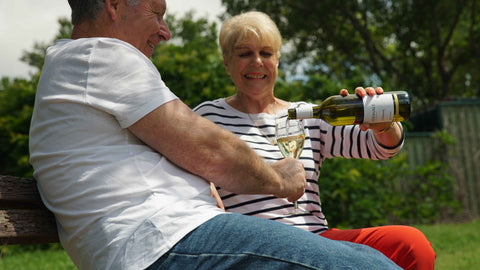Alcohol consumption can hinder your health journey, affecting weight loss, sleep cycles and muscle development. Edenvale alcohol-removed wines can help you maintain your progress while giving you the real wine experience.
How Your Exercise Routine Is Impacted By Alcohol Consumption
Exercise regimes are an important element of many people’s health journeys; however, some don’t understand the impact that alcohol consumption can have on their success at the gym.
By choosing alcohol-removed options you can remain involved in social gatherings without ruining your progress.
We all know that a hangover can make you lethargic and unmotivated to exercise, however, let’s have a look at the physical effects of alcohol on the body and how that affects an exercise routine.
Alcohol’s Impact On The Body
Alcohol acts as a sedative, a central nervous system depressant, causing brain functioning to slow. This reduced brain function leads to drowsiness, decreased ability to focus and weakening muscles. As the body metabolises the alcohol, the sedative effects do wear off, however fatigue lingers as the body attempts to heal from the damage that the alcohol caused.
As such, consumption of alcohol leads to both a decreased motivation to exercise and decreased performance at the gym.
Here are some other health risks that come with consuming alcohol before and after an exercise regime:
Muscle Development
Muscle development is affected if alcohol is consumed shortly after exercise. As a result of decreased brain function and dehydration, hormone secretion is also reduced. This means that muscles are not able to heal as efficiently as they should, leading to a decrease in results from strength exercises, as the muscles cannot recover to increase strength.
In addition to this weakness, drinking alcohol will also leave muscles feeling sore for longer, and potentially lead to not exercising as frequently.
Cardiovascular Disease
Cardiovascular Disease (CVD) affects more than four million Australians. While a lot of things can cause CVD, alcohol is a leading contributing factor. At the time of drinking, alcohol can cause a temporary increase in heart rate and blood pressure.
In the long-term, excessive drinking can lead to ongoing increased heart rate, high blood pressure, weakened heart muscle, and irregular heartbeat, which ultimately leads to CVD development. Conversely, exercising without the effects of alcohol leads to increased strength in heart muscles, respiratory fitness and a lowering in blood pressure.

trong>Weight Loss
Losing weight is a goal for many Australians, however it is often hard to achieve. Consuming alcohol can affect weight loss goals for multiple reasons, including:
- increased calories in many alcoholic drinks,
- decreased motivation to exercise, and
- the order in which the body prioritises its energy sources.
When there is alcohol in the system, the body will burn the alcohol before any other energy sources. As such, when the body is using alcohol as an energy source, it is not burning the carbohydrates and lipids it needs to be burning to lose fat.
Dehydration
The best way to combat water loss through sweating is to stay hydrated throughout the day. This allows the body to keep up the healthy toxins in the blood and ensure the body functions properly while exercising. Post-exercise, it is even more important to replenish hydration levels by drinking water.
In contrast to this, alcohol causes dehydration by decreasing the amount of the hormone vasopressin that the body creates. Vasopressin (also known as antidiuretic hormone) is the hormone that causes the body to retain water and limits the amount of urine your kidneys make. A drop of vasopressin in the system has a diuretic effect, which is what leads to so many trips to the bathroom, ultimately causing dehydration.
Exercising when dehydrated can lead to muscle soreness and an increased likelihood of injuries such as muscle tears and strains, as the muscles are less flexible than they would be when hydrated so cannot heal as easily.
Dehydration also means that the body is unable to regulate heat through producing sweat, meaning that the body’s internal temperature will rise higher than it usually would. Heart rate will then increase, leading to tiredness more quickly. Exercising while dehydrated can also lead to collapse and organ damage.

Sleep Impairment
Sleep can be adversely affected by the consumption of alcohol. A full, uninterrupted night’s sleep is important in performing well at the gym; not only providing focus, but also giving muscles time to heal between workouts. Though a depressant like alcohol is likely to assist with falling asleep faster, research has shown alcohol will decrease REM sleep and The Sleep Foundation has stated that consuming alcohol can decrease sleep quality by up to 39.2 per cent.
Enjoy a drink with friends without worrying about the repercussions on your exercise routine with Edenvale Beverages. Shop our alcohol-removed beverage options on our website here, or find our products in Woolworths, Coles, Dan Murphy’s or local stockist.

